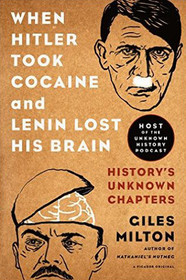Books like this are meant to be short, sweet, provide interesting details and, as a result, are not always completely factual. Plus, the authors aren't always concerned with details not totally relevant to the story.
Due to my extensive reading over 70 years---yes, I was reading early and still have my first book, a treasure titled "My Little Truck Book"---I was already knowledgeable about many of the stories in this book. In fact, more than once I've read entire books written about some of the stories related here. Still, the book was entertaining and is definitely light reading. Moreover, I was impressed with the author telling us the famous Dr. Crippen was eventually proven innocent by a DNA test, a fact not known to many who have heard of that trial. I only learned of it recently myself, when something led me to look at the Wikipedia page on Crippen. Too bad the British hanged him over a hundred years ago. So maybe the author did check the details on many of his stories.
Still, I discovered two glaring---at least to me---mistakes in the book. First, in "Pigeon to the Rescue," the author states the U.S. World War I battalion commander was aghast when "...he learned that three hundred of his men had been killed." This is a mistake often made by authors, many of whom should know better. They read there was such-and-such number of casualties and assume these were all killed, when the word casualties combines those who were killed, wounded or missing in action. In this case, according to the "Lost Battalion" page in Wikipedia page, roughly 197 were killed and approximately 150 were missing or taken prisoner.
Second, in "Dressed to Kill," the author writes about a woman serving as a man in the British "51st Division of the Royal Engineers." This should have been caught by an editor, as no such unit exists in the Royal Engineers. The 51st Division was an infantry division, and, like many infantry units, had one or more Royal Engineer companies serving with it. As the woman was a "sapper," she served in an engineer company.
This one isn't a keeper and I'm posting it as it is WLed. Hopefully, some of the stories in it will spur an interest in future readers to read some the entire books written about incidents in this one. That's the true value of this type of book.
Due to my extensive reading over 70 years---yes, I was reading early and still have my first book, a treasure titled "My Little Truck Book"---I was already knowledgeable about many of the stories in this book. In fact, more than once I've read entire books written about some of the stories related here. Still, the book was entertaining and is definitely light reading. Moreover, I was impressed with the author telling us the famous Dr. Crippen was eventually proven innocent by a DNA test, a fact not known to many who have heard of that trial. I only learned of it recently myself, when something led me to look at the Wikipedia page on Crippen. Too bad the British hanged him over a hundred years ago. So maybe the author did check the details on many of his stories.
Still, I discovered two glaring---at least to me---mistakes in the book. First, in "Pigeon to the Rescue," the author states the U.S. World War I battalion commander was aghast when "...he learned that three hundred of his men had been killed." This is a mistake often made by authors, many of whom should know better. They read there was such-and-such number of casualties and assume these were all killed, when the word casualties combines those who were killed, wounded or missing in action. In this case, according to the "Lost Battalion" page in Wikipedia page, roughly 197 were killed and approximately 150 were missing or taken prisoner.
Second, in "Dressed to Kill," the author writes about a woman serving as a man in the British "51st Division of the Royal Engineers." This should have been caught by an editor, as no such unit exists in the Royal Engineers. The 51st Division was an infantry division, and, like many infantry units, had one or more Royal Engineer companies serving with it. As the woman was a "sapper," she served in an engineer company.
This one isn't a keeper and I'm posting it as it is WLed. Hopefully, some of the stories in it will spur an interest in future readers to read some the entire books written about incidents in this one. That's the true value of this type of book.
Barbara M. reviewed When Hitler Took Cocaine and Lenin Lost His Brain: History's Unknown Chapters on + 147 more book reviews
I had added this book to my wish list when someone else recommended it. This is a series of very short stories about true events--some of which I had heard about (i.e., the Japanese soldier from WWII surrendering in the 1970s--I was in my 20s then; a few weeks back I learned from a biography program about Hitler that Hitler was a serious drug addict during WWII). This book is like a "Reader's Digest" of trivia. It's a quick, sometimes enlightening read--an OK book (not awful but also not great).
At the end of the book the author provides a list for each story of additional resources one may want to check out. I suspect that the author condensed info from these sources to write each story.
At the end of the book the author provides a list for each story of additional resources one may want to check out. I suspect that the author condensed info from these sources to write each story.




![header=[] body=[Get a free book credit right now by joining the club and listing 5 books you have and are willing to share with other members!] Help icon](/images/question.gif?v=90afaeb39)
